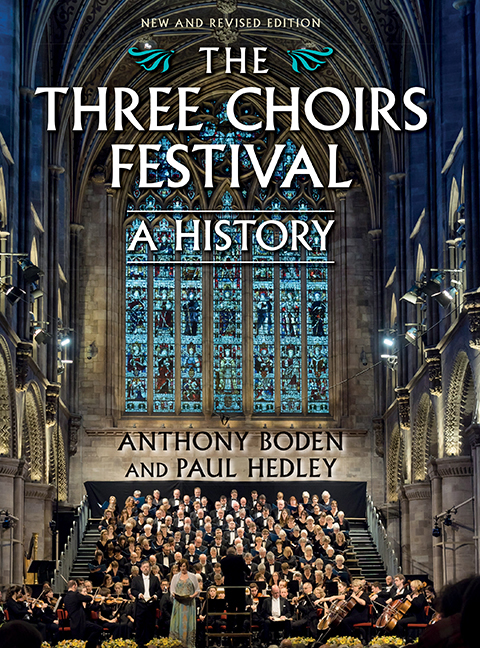Book contents
- Frontmatter
- Contents
- List of Illustrations
- Preface
- Acknowledgements
- List of Abbreviations
- List of Cathedral Organists
- 1 Origins
- 2 A Fortuitous and Friendly Proposal
- 3 A Numerous Appearance of Gentry
- 4 ‘The Musick of my Admiration Handel’
- 5 The Gentlemen and the Players
- 6 Avoiding Shipwreck
- 7 Prima voce
- 8 Favourites and Flops
- 9 Sacred and Profane
- 10 Froissart
- 11 The Unreasonable Man
- 12 The Dream
- 13 Beyond these Voices
- 14 An Essentially English Institution
- 15 The Elgar Festivals
- 16 Dona nobis pacem
- 17 Recovery
- 18 Association
- 19 A New Epoch
- 20 Jubilee
- 21 Theme with Variations
- 22 Houses of the Mind
- 23 ‘A Gold-Plated Orchestra’
- 24 A New Millennium
- 25 Reorganisation
- 26 An Invitation to the Palace
- Appendix Three Choirs Festival Timeline
- Select Bibliography
- Index
- Plate section
8 - Favourites and Flops
Published online by Cambridge University Press: 11 August 2017
- Frontmatter
- Contents
- List of Illustrations
- Preface
- Acknowledgements
- List of Abbreviations
- List of Cathedral Organists
- 1 Origins
- 2 A Fortuitous and Friendly Proposal
- 3 A Numerous Appearance of Gentry
- 4 ‘The Musick of my Admiration Handel’
- 5 The Gentlemen and the Players
- 6 Avoiding Shipwreck
- 7 Prima voce
- 8 Favourites and Flops
- 9 Sacred and Profane
- 10 Froissart
- 11 The Unreasonable Man
- 12 The Dream
- 13 Beyond these Voices
- 14 An Essentially English Institution
- 15 The Elgar Festivals
- 16 Dona nobis pacem
- 17 Recovery
- 18 Association
- 19 A New Epoch
- 20 Jubilee
- 21 Theme with Variations
- 22 Houses of the Mind
- 23 ‘A Gold-Plated Orchestra’
- 24 A New Millennium
- 25 Reorganisation
- 26 An Invitation to the Palace
- Appendix Three Choirs Festival Timeline
- Select Bibliography
- Index
- Plate section
Summary
THROUGHOUT the eighteenth century the music of Handel had dominated Three Choirs and, supreme among all his works, Messiah remained safely anchored to the Festivals for the whole of the nineteenth and much of the twentieth centuries. It was a brave S. S. Wesley who, in his first Festival as conductor at Hereford (1834), dared to present only a selection from Messiah instead of the whole work – an experiment which he was not allowed to repeat. However, the Handelian domination did slowly subside as successive Festival conductors, by patient persistence, gradually stimulated the appetites of their provincial audiences to accept a more varied oratorio diet. The turning point came in 1800(W).
Joseph Haydn (1732–1809) had attended the Handel Festival at Westminster Abbey in 1791. The experience had an enormous effect upon him. After one performance of Messiah he said of Handel: ‘He is the master of us all’, and, as a result of this festival, began to consider the possibility of composing an oratorio of his own. Haydn completed The Creation in 1798. The work occupied him for two whole years, of which time he said, ‘Never before was I so devout as when I composed The Creation. I knelt down each day to pray to God to give me strength for my work.’ When urged to bring it to a conclusion, he calmly replied, ‘I spend much time over it, because I intend it to last a long time.’
The Creation was published in 1800, performed in London in March, and heard for only the third time in England at the Worcester Music Meeting of that year. The individuality of Haydn's genius was not at first fully understood by Three Choirs audiences nurtured on the style of Handel, but selections from The Creation became ever more popular as the century progressed.
- Type
- Chapter
- Information
- The Three Choirs Festival: A HistoryNew and Revised Edition, pp. 120 - 129Publisher: Boydell & BrewerPrint publication year: 2017



